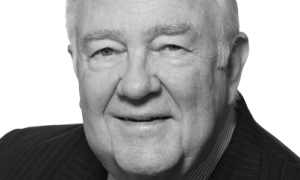HOST: joining me now, Attorney General under Ronald Reagan, Edwin Meese. It's a pleasure to have you with us. You must have known Sandra Day O'Connor, she was a Reagan nominee. You must have nostalgic thoughts as she rides into the sunset.
ED MEESE: I know her and her husband John well. I’ve enjoyed them as friends as well as admirrd her work on the court.
HOST: You have been, Mr. Meese, closely involved with past confirmation hearings. Most notably and most famously, the 1987 nomination of Judge Robert Bork. How is this one likely to be similar and how is it likely to be different?
MEESE: I think there's one difference to start with, that is the republicans have the leadership in the Senate. Whereas in 1987, the Democrats had just gained the leadership. And I think there's probably a big difference that way. I think in some of the similarities, unfortunately, I hear the rumors, at least, and see some of the news media comment that some of the left wing special interest groups that opposed Bob Bork are looking for a fight again and arming for some kind of a battle, which I hope will not happen. But unfortunately it appears it might.
HOST: This time around, I remember the last time within a couple of hours of the announcement of Mr. Bork's nomination, Judge Bork's nomination, Senator Kennedy had gone to the floor of the Senate and a machine was in place sort of starting to attack him. I would think now that the people on the right as well as on the left would be getting their machinery in gear, right?
MEESE: I think that will be the one of the big differences. That is for the first time in 1987, the leftist zoid make a political contest out of it, rather than a tough but civilized confirmation proceeding. This time I think people on the other side of the political spectrum will be prepared. I think it will be a more level playing field.
HOST: What would be an ideal justice in your mind?
MEESE: An ideal justice is the kind of person that President Bush has described. That is someone who is faithful to the constitution, who understands the role of a judge is to apply the law and not to make it up to fit some ideological objective or some political preference.
HOST: Should nominees have to answer questions about their particular points of view on issues of federalism, of judicial activism, social issues such as abortion or same-sex marriage, et cetera?
MEESE: Well, I don't think that they can answer questions on specific topics or how they would rule on a case. I think to ask them questions about their philosophy about what a judge should do, their views on the constitution, things such as that, are perfectly proper. To try to pin them down to how they would decide a particular case, had whether it be row against wade or any other case, I think not only would be wrong but in the past nominees from both parties have said that would be the wrong thing to do in front of a Senate Judiciary Committee.
HOST: Presidents don't get the opportunity to nominate Supreme Court justices very often, so it's an exciting evening, no matter who the choice is. I’d like to turn the questioning to something you may have perspective on. Since you were chief of staff with President Reagan and worked in the Justice Department as well, you might have some point of view on what's going on with Rove and his ongoing involvement in the investigation. Should he resign?
MEESE: He definitely should not resign. He’s done nothing wrong. There’s no violation of the law. There’s no leak, actually. He was responding to a question about how this particular man Wilson, who had seemed unqualified to the job ever got appointed to find out about the certain commodities from Nigeria. The question was did the vice president recommend him. Obviously Rove answered that he didn't, and that he understood it was someone in the CIA. And he had no intent to violate anyone's cover. Actually this woman hadn't been an undercover operative for like seven years and was some sort of functionary at the CIA at the time. I think there's much ado about nothing in this whole case.
HOST: all right, mar. Meese. Thank you so much. It was great to have the benefit both of your perspective and a little bit of history as well. Thank you so much.
MEESE: Thank you.
HOST: Appreciate it. Edwin Meese, former Attorney General of the United States, now at the Heritage Foundation. Joining me on the business impact on whoever the president's Supreme Court nominee, the Washington Journal. Good to see you.
Interview from CNBC



